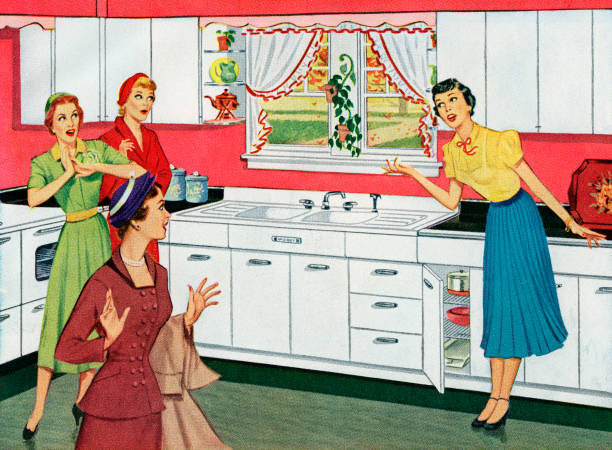In recent years, a concerning trend has emerged on social media and in popular culture–the rise of the “Trad Wife” phenomenon. Short for “traditional wife,” the movement romanticizes an era that never truly existed, incorporating both men and women into their demographics. This “trend” glorifies the institution of gender roles, emphasizing the virtues of women being submissive homemakers solely focused on catering to their husbands and children. While the desire to prioritize family life is understandable, the version promoted by the Trad Wife trend carries significant dangers and harmful ramifications, particularly regarding financial dependence on men. It offers simplistic solutions to issues that are far more complex.
The Trad Wife ideation may appeal to some frustrated individuals seeking a return to fundamentalist values and roles, even so it is crucial to approach it with critical thinking. Proponents of this viewpoint often cite nostalgia for a simpler time, where gender roles were rigidly defined and people were supposedly happier and more fulfilled. Trad wives embody the capitalist fatigue that comes with “hustle” culture, as many women perform domestic duties while also holding a job. However, the movement does not adequately address the nuances of this lifestyle and instead relies on a misunderstanding of history and the stigmatization of feminism.
Influencers promoting this way of life showcase idyllic images of domestic bliss, homemaking skills, and submission to their husbands as the ultimate form of femininity. In reality, this portrayal gives audiences an unrealistic look at what it means to embrace traditional values or perform motherhood as it only showcases curated versions of their lives. A few of the most notable influencers with large followings that span beyond TikTok include Nara Smith, Hannah Neeleman of @ballerina.farm, and Estelle Williams. While some are not distinctly advocating for a specific agenda, the patriarchal undertones that accompany their “influencing” are inherently political, especially when they characterize their lifestyle as aspirational.
The veneer that women can trade in work for romanticized aesthetics begins to peel and crack when people realize that domestic labor is still arduous work. Particularly in feminist frameworks, domestic labor is unpaid. People can fail to remember this reality because, through the lens of capitalism, it is not directly profitable or stimulating the economy. Nevertheless, the US Bureau of Labor Statistics reported that it would cost $120,900 to employ all the cooks, cleaners, chauffeurs, and nannies needed to meet a housewife’s annual contribution to the home. Furthermore, trad wife influencers generate income through social media. The majority of women offline do not have access to this and at times must work multiple jobs to ensure their household survives. Liberation is for all women, not just those that can afford it.
Moreover, the trad wife movement does not communicate the risks that accompany the mindset that outearning a husband is emasculating. The greatest hazard is the high probability of financial dependency. It can strip women of their autonomy, leaving them vulnerable to various risks such as economic abuse, lack of control over their lives, and difficulties in cases of divorce. It can also perpetuate unequal power dynamics within relationships, where the financial provider holds significant leverage over decision-making.
Some argue that being a trad wife is simply a lifestyle choice, not a movement. This line of reasoning is deceptive and has tangible consequences. Believing a woman’s primary place is in the home is not a “choice,” but is an ideology that bleeds into law and affects all women. Legislators have repealed reproductive rights and repressed childcare reform, actions that work in tandem with trad wife beliefs.
In the end, it is essential to recognize that being a wife and a mother is an honorable and valid life goal, but it should not come at the cost of financial independence and autonomy. Encouraging financial literacy, healthy partnerships based on mutual respect, shared responsibilities, and equal decision-making ensures individual agency. The notion that being a “traditional” wife returns women to their roots and “primal feminine existence” is a misinterpretation of history and biology. Throughout every century, women have had practical positions outside of the home sphere. The trad wife is a 1950’s construct and illusion.



